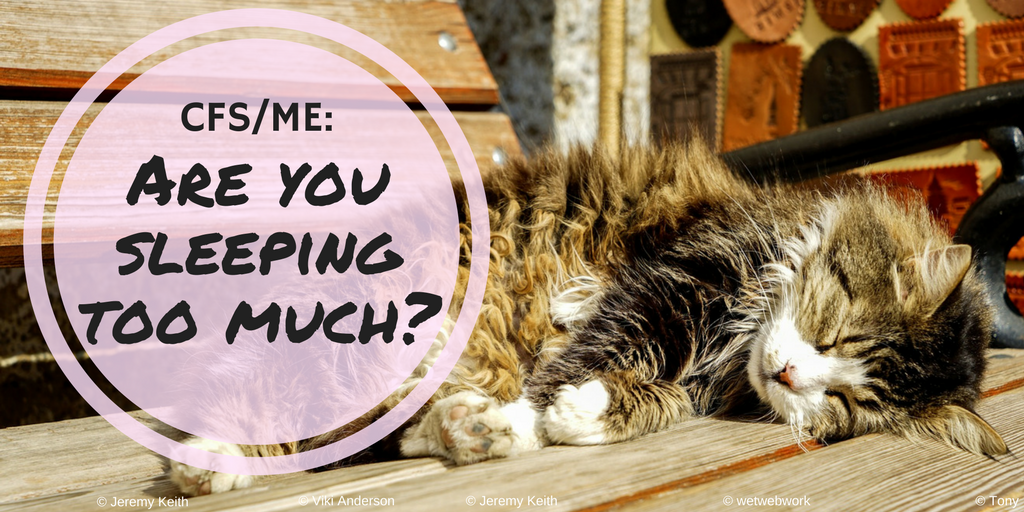
Difficulty with sleep is common for people with CFS/ME. Some people find they are sleeping too much, while others find they are not sleeping enough. If you experience problems with sleep there are several things you can do to help yourself.
There is no such thing as an ideal amount of sleep. For example, some people need 10 hours, while others only need five. An average night’s sleep is around eight hours. When the amount of sleep someone is getting is causing an increase in fatigue that is when it becomes a problem.
When people first have CFS/ME they often over sleep. People who have had CFS/ME for a longer period of time often go from over sleeping to not being able to sleep enough, despite high fatigue levels.
Are you sleeping too much?
When you have an acute illness, like an infection, your body may require more sleep to assist recovery. With CFS/ME, the fatigue and other symptoms are not improved by sleep so, although sleep may have been helpful at the beginning of your illness, it may not be making any difference now.
It is not unusual for people suffering from CFS/ME to report that they sleep for 12 or more hours, yet still feel fatigued and unrefreshed on waking. So with CFS/ME, on the odd occasion when you also have an acute illness or are sleep deprived, it is normal to “catch up on sleep” by sleeping for longer than usual. However, some people with CFS/ME find that they regularly sleep much more than they did prior to the illness.
Often people think that if they are fatigued they need sleep, but the fatigue in CFS/ME is not improved by sleep. Therefore, it is difficult for people to tell the difference between when they are tired due to lack of sleep and when they feel fatigued, which can be made worse by increase sleep.
The consequences of sleeping too much are:
- Increased need for more sleep.
- The body gets used to excessive sleep and late waking.
- Inability to concentrate properly.
- Loss of motivation and energy whilst awake.
- Reduced enjoyment and satisfaction with life.
What can you do practically about over sleeping?
First, keep and complete a sleep diary to establish exactly how much sleep you are getting. If you are sleeping too much, look at gradually reducing your amount of sleep by getting up earlier. Aim to get up at the same time every morning and go to bed when you feel tired at night. When you have established a regular routine gradually reduce how long you are sleeping, for example by 15 minutes at a time. Establishing a routine will help you gain more control over your symptoms.
Sleep routine
Everybody has a biological clock which regulates activity levels, temperature and sleep. The example of jet lag demonstrates how our body’s rhythm can be out of synch with that of our environment. In CFS/ME some people will be sleeping in the day and be awake at night. Others will be “cat napping” throughout the day.
“Cat napping”
It is advised that people with CFS/ME avoid “cat napping” in the day if possible. “Cat napping” can lead to people over sleeping or not being able to sleep at night. Also, many people feel groggy after sleeping and take a while to come round, often feeling worse than they did before they went to sleep. It is important in CFS/ME for people to balance the demands for energy that they are making on their body. This is difficult if your sleep routine is chaotic.
If you do not think you can manage to get through a whole day without sleeping, do not worry. Aim to regulate your sleep in the day to a particular time, e.g. 2pm, and for a regular length, e.g. one hour. (An alarm clock may be needed to do this effectively.) Again, start with an amount of sleep that is similar to what your body is trying to take now. Once you have done this, reduce the amount of time you sleep during the day gradually over a few weeks, aiming eventually (if possible) to take all your sleep at night.
You may find it helpful, if you are used to “cat napping,” gradually to replace sleep during the day with quality rest. This allows you to help your body to recover when fatigued without disrupting your sleep pattern.
Do not worry!
Initially the change to your sleeping pattern may make you feel worse and more fatigued. In the long term, you should feel more energised. Another benefit of reducing your sleep is that you will have more time available for the activities you choose to do. Quality not quantity also applies to sleep.
If you do not manage to stop “cat napping” or over sleeping completely, do not worry. Keep trying to regulate your sleep to the same time each day and reduce it as much as possible. Remember, altering your sleep pattern is important, but this is only one part of the management of CFS/ME.
This blog is taken from Fighting Fatigue: A Practical Guide to Managing the Symptoms of CFS/ME, by Sue Pemberton and Catherine Berry.
